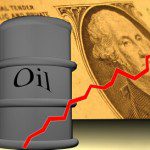A sensible story of causation regarding oil prices and stock prices made by countless economists is that “rising oil prices increase the cost of energy and therefore reduce corporate profits and consumers’ spending power, thus putting drags on stock prices and the economy.” Stunningly, as far as I can determine, however, no evidence supports that claim, as the discussion below will show.
economists is that “rising oil prices increase the cost of energy and therefore reduce corporate profits and consumers’ spending power, thus putting drags on stock prices and the economy.” Stunningly, as far as I can determine, however, no evidence supports that claim, as the discussion below will show.
By Vadim Pokhlebkin/Robert Prechter (elliottwave.com) originally entitled The Fundamental Flaw in Conventional Financial and Macroeconomic Theory (Part II)*
Claim #2: “Rising oil prices are bearish for stocks.”
This is a ubiquitous claim. It would take weeks to collect all the statements that economists have made to the press to the effect that recently rising oil prices are “a concern” or that an unexpected (they’re always unexpected) “oil price shock” would force them to change their bullish outlook for the economy.
For many economists, the underlying assumption about causality in such statements stems from the experience of 1973-1974, when stock prices went down as oil prices went up. That particular juxtaposition appeared to fit a sensible story of causation regarding oil prices and stock prices, to wit:
“Rising oil prices increase the cost of energy and therefore reduce corporate profits and consumers’ spending power, thus putting drags on stock prices and the economy.”
Figure 7 shows, however, that for the past 15 years there has been no consistent relationship between the trends of oil prices and stock prices. Sometimes it is positive, and sometimes it is negative.

In fact, during this 15-year period it has been positive for more time than it has been negative and the quarters during this period when the economy contracted the most occurred during and after the oil price collapse of 2008. Thereafter oil prices doubled as the economy was reviving in 2009. None of this activity fits the accepted exogenous-cause argument.
The above graph negates all the comments from economists who say that an “oil shock” would hurt the stock market and the economy. It also throws into doubt the very idea that stock prices and oil prices are linked.
Could rising oil prices perhaps be bullish for stocks?
Yes, once again we can argue both sides of the exogenous-cause case. Consider:
- As the economy begins to expand, business picks up, so stock prices rise; and
- as business picks up, demand for energy rises as businesses gear up and operate at higher capacity. That’s why stocks and oil go up together.
The above arguments make sense, don’t they, but neither claim explains the data. Sometimes oil and stocks go up or down together, and sometimes they trend in opposite directions. As with stocks and interest rates we discussed in Part I of this series [see here], we could easily isolate examples of all four pairs of coincident trends.
[The above article is presented by Lorimer Wilson, editor of www.munKNEE.com and the FREE Market Intelligence Report newsletter (sample here) and may have been edited ([ ]), abridged (…) and/or reformatted (some sub-titles and bold/italics emphases) for the sake of clarity and brevity to ensure a fast and easy read. The author’s views and conclusions are unaltered and no personal comments have been included to maintain the integrity of the original article. This paragraph must be included in any article re-posting to avoid copyright infringement.]
*http://www.elliottwave.com/freeupdates/archives/2014/09/09/Don-t-Get-Ruined-by-These-10-Popular-Investment-Myths-%28Part-II%29.aspx#axzz3IOE2gK92 (© 2014 Elliott Wave International)
If you liked this article then “Follow the munKNEE” & get each new post via
- Our Newsletter (sample here)
- Twitter (#munknee)
 munKNEE.com Your Key to Making Money
munKNEE.com Your Key to Making Money


